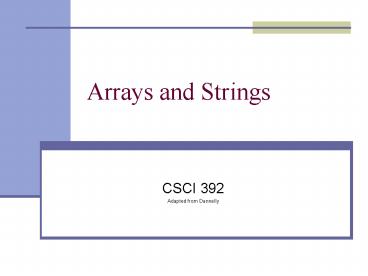Arrays and Strings - PowerPoint PPT Presentation
Title:
Arrays and Strings
Description:
Arrays and Strings CSCI 392 Adapted from Dannelly – PowerPoint PPT presentation
Number of Views:126
Avg rating:3.0/5.0
Title: Arrays and Strings
1
Arrays and Strings
- CSCI 392
- Adapted from Dannelly
2
Declaring an Array Variable
- Two versions of the same declaration
- int intlist
- int intlist
- Declaring a two-dimensional array
- int twodimarray
- int twodimarray
3
Creating Space for an Array
- Given the declaration
- int myarray
- You must also tell the VM to create space
- myarray new int100
- You can do both steps in one line
- int myarray new int100
- You can also wait until runtime to set the array
size - int runtimeSize 100
- int myarray new intruntimeSize
4
Initializing Array Values
- Version One
- int one_to_four new int 1,2,3,4
- Version Two
- int one_to_four 1,2,3,4
- An Array of Strings
- String names "Bob","Joe","Sue","Fred"
- Computing Initial Values at Runtime
- int examscores gradeExam(1),gradeExam(2)
5
Using Arrays
- Array Variables are Objects. So, they have their
own class methods and instance properties. For
example - myarray.length
- Arrays.sort(myarray)
- Array indexes must be of type int.
- Using an index out of bounds throws
ArrayIndexOutOfBoundsException
6
Copying Arrays
- copy method prior to JDK 1.6
- System.arraycopy (original, 0,
- copy, 0,
- original.length)
- Copy method JDK 1.6 or later
- intArray2 Arrays.copyOf (intArray,
intArray.length)
7
import java.util.Arrays public class Array_copy
public static void main(String args) int
intArray 1,2,3 int intArray2
4,5,6 int count 0 while (count ! 3)
System.out.println ("intArray "
intArraycount) count count 1
count 0 while (count ! 3)
System.out.println ("intArray2 "
intArray2count) count count 1
count 0 intArray2 Arrays.copyOf
(intArray, intArray.length) while (count !
3) System.out.println ("intArray2 "
intArray2count) count count 1
intArray 1 intArray 2 intArray 3 intArray2
4 intArray2 5 intArray2 6 intArray2 1 intArray2
2 intArray2 3
8
Array Methods
- import java.util.Arrays
- // compare the contents of two arrays
- if (Arrays.equals (array1, array2))
- System.out.println ("contents are the same")
- // quick sort an array
- Arrays.sort (myarray)
- // initialize the first ten positions with a 1
- Arrays.fill (myarray, 0, 9, 1)
- // fill entire array with value of 1
- Arrays.fill (myarray, 1)
9
char ! String
- public class samCopy2
- public static void main(String args)
- char copy1 't', 'e', 's','t'
- char copy2 'b', 'e', 's', 't'
- System.out.println ("copy1 "
String.valueOf(copy1)) - System.out.println ("copy2 " copy2)
copy1 test copy2 C_at_8f4fb3
10
char ! String
- This code yields a compiler error.
- class string_test_2
- static void main(String args)
- String myvar "bob"
- myvar0 'B' // error myvar is not an
array
11
String Methods
- Compare two strings
- String name1, name2
- ...
- if ( name1.compareTo(name2) lt 0 ) // like C
- Convert an integer into a string
- String mystring String.valueOf (myint)
- Convert a string into an integer
- int myint Integer.parseInt (mystring)
- Append
- name " "
- name first last
12
More String Methods
- Extract a Substring
- String s1 name.substring(0, 4)
- Remove spaces at the end
- name name.trim()
- Does the string contain a number
- String str1
- ...
- char c str1.charAt (0) // get first char
- if (Character.isDigit(c)) // test that char
- System.out.print ("str1 starts with a number")































